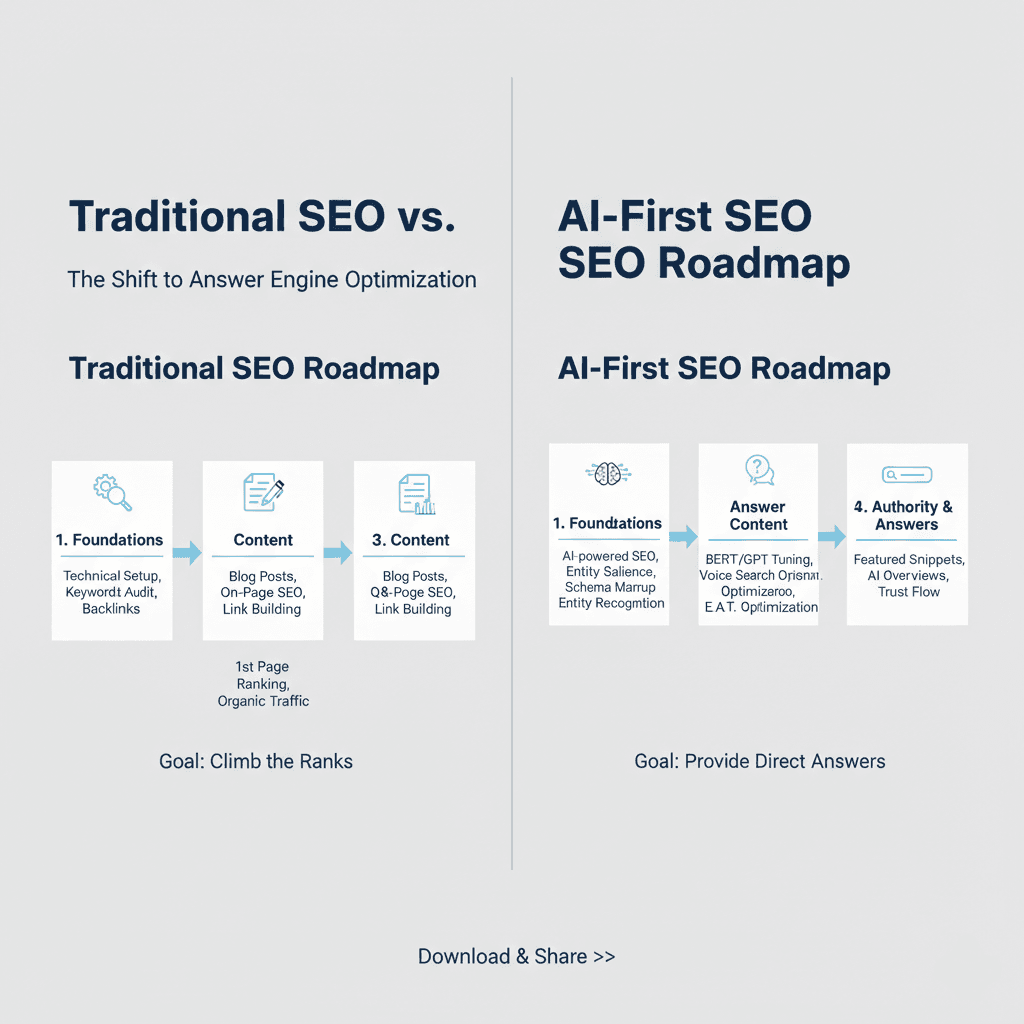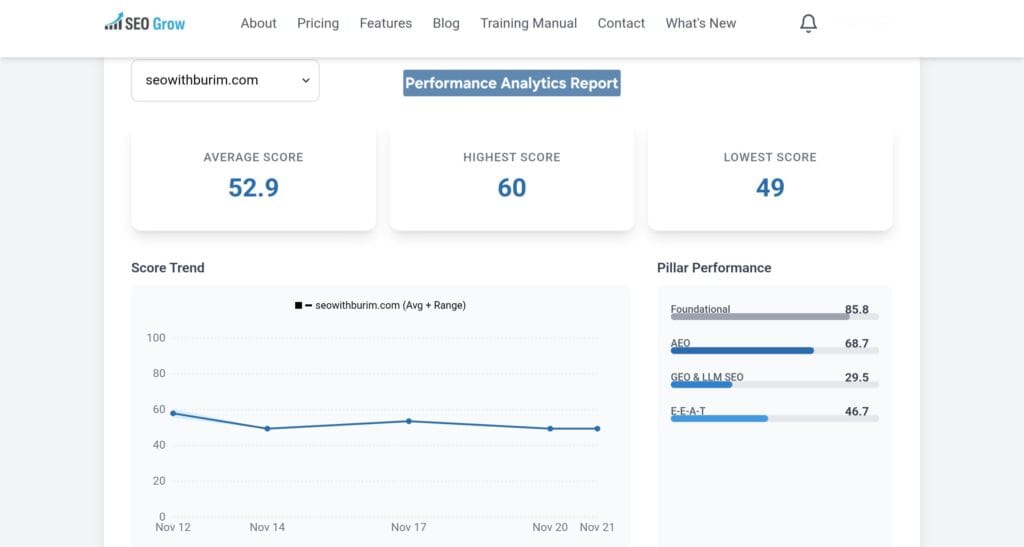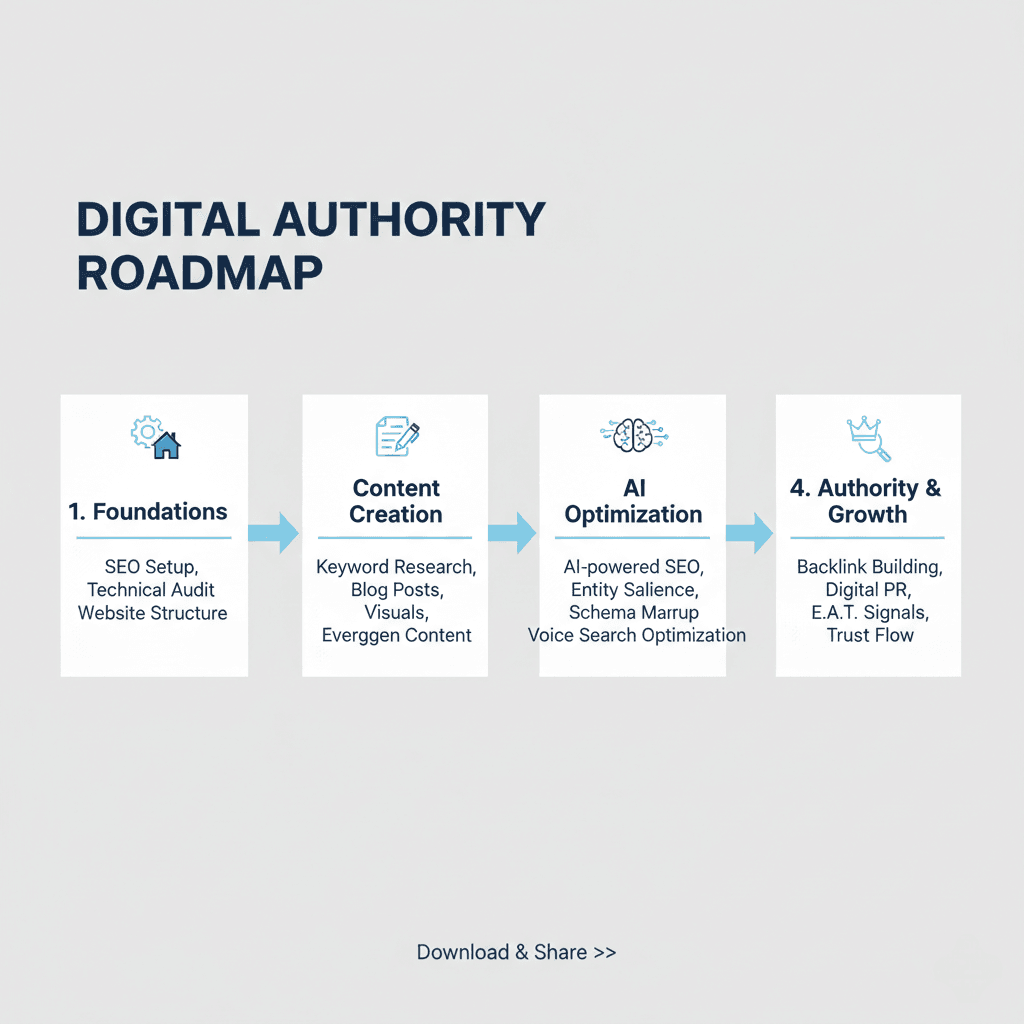SEO Roadmap 2026: How to Create a High Growth Optimization Strategy
An SEO roadmap is a strategic document that outlines the specific actions, timelines, and resources required to improve a website’s organic visibility. It is more than a simple checklist. It is a comprehensive growth plan that aligns technical execution with business goals.
In 2026, a standard roadmap is no longer sufficient. The rise of AI-driven search means your strategy must account for how machines interpret, trust, and cite your content. A modern SEO strategy must now bridge the gap between traditional rankings and AI search visibility.
Table of Contents
The Evolution of the SEO Strategy
In previous years, roadmaps focused almost entirely on keyword density and backlink quantity. Today, the focus has shifted toward Citable Potential. This refers to how likely a Generative Engine is to use your website as a primary source of truth.
To stay ahead, your roadmap must incorporate three core pillars:
- Technical Excellence: Ensuring a flawless foundation for crawlers.
- E-E-A-T (Experience, Expertise, Authoritativeness, Trustworthiness): Proving you are a credible source.
- AEO (Answer Engine Optimization): Structuring content to be pulled into AI snapshots and summaries.
The 2026 SEO Roadmap Framework
A successful strategy is built in phases. Skipping the foundation to focus on advanced tactics is a common mistake that leads to stagnating results.

Phase 1: The Multi-Layered Audit
The first step in any roadmap is a deep dive into the current status of the domain. You cannot plan a route if you do not know your starting point.
- Technical Audit: Check for crawl errors, site speed (Core Web Vitals), and mobile responsiveness.
- AI-Readiness Audit: Use specialized tools to see how well your pages are optimized for generative search. You can perform a dedicated AEO Audit to see if your content is structured for modern answer engines.
- E-E-A-T Assessment: Evaluate author bios, site transparency, and citation quality using an EEAT Checker.
Phase 2: Keyword Intelligence and Topic Clusters
Keyword research has evolved from finding “words” to understanding “entities.”
- Intent Mapping: Group your keywords by user intent (Informational, Navigational, Transactional).
- Topic Clusters: Identify core “pillar” pages and create supporting “cluster” content to build topical authority.
- Semantic Variation: Focus on natural language patterns that users use when speaking to voice assistants or AI chatbots.
Phase 3: Content Optimization and GEO
Once you have your keywords, you must execute the content. This phase of the roadmap involves:
- On-Page Elements: Optimizing H1 to H4 tags, URL structures, and meta data.
- GEO Strategy: Implementing Generative Engine Optimization. This involves making content highly data-dense and easy for LLMs to parse. To verify your progress, running a GEO Audit is essential to see how you compare to competitors in AI summaries.
Phase 4: Authority and Trust Building
Search engines prioritize brands they can trust.
- Backlink Audit: Identify and remove spammy links while finding opportunities for high-authority placements.
- Digital PR: Focus on earning mentions from reputable industry publications rather than low-quality directory links.
- Brand Signals: Ensure your business details (NAP: Name, Address, Phone) are consistent across the web to build local and global trust.
Integrating AI Tools into Your Roadmap
The most significant change in 2026 is the availability of deterministic AI auditing. Traditional tools often guess how an algorithm works, but our AI SEO Auditor provides a rule-based analysis of your page’s citable potential.
By integrating these tools into your roadmap, you move from reactive SEO to proactive growth. You can see exactly why a page is failing to appear in AI Overviews and take immediate corrective action.

Read also about aeo for healthcare, aeo for law firms and ai seo audit.
Why Every Business Needs a Custom SEO Roadmap
No two websites are identical. A SaaS company requires a different SEO strategy than a local service provider or an e-commerce giant. A custom roadmap ensures that your budget and time are spent on the activities that will move the needle the most.
Key Benefits of a Professional Roadmap:
- Transparency: Stakeholders can see exactly what is being worked on and why.
- Prioritization: It ensures that critical “blocker” issues are fixed before moving to secondary optimizations.
- Predictability: It allows for better forecasting of traffic and lead growth over a 6 to 12 month period.
Conclusion
The SEO landscape is moving faster than ever. A roadmap created two years ago is likely obsolete today. By focusing on a holistic strategy that combines traditional technical SEO with modern AI-readiness, you position your brand as a leader in the next era of search.
If you are ready to stop guessing and start growing, it is time to build a data-driven SEO strategy. Use the tools available to audit your site’s current performance and map out a path to the top of the search results.
You may also want to read about:






